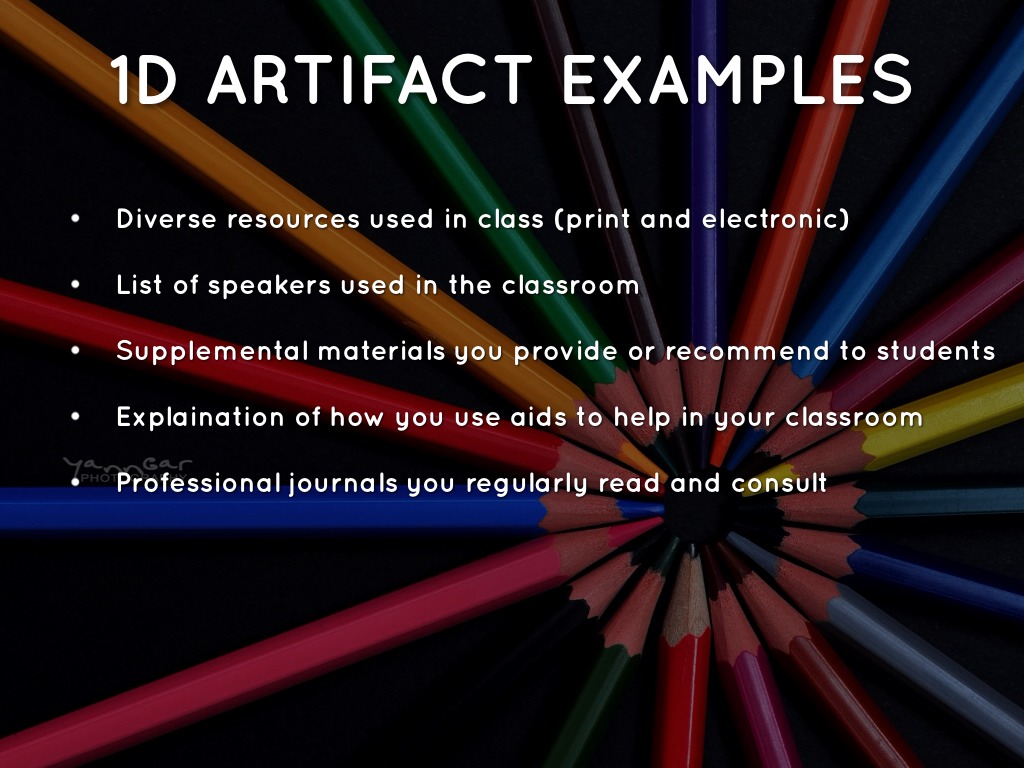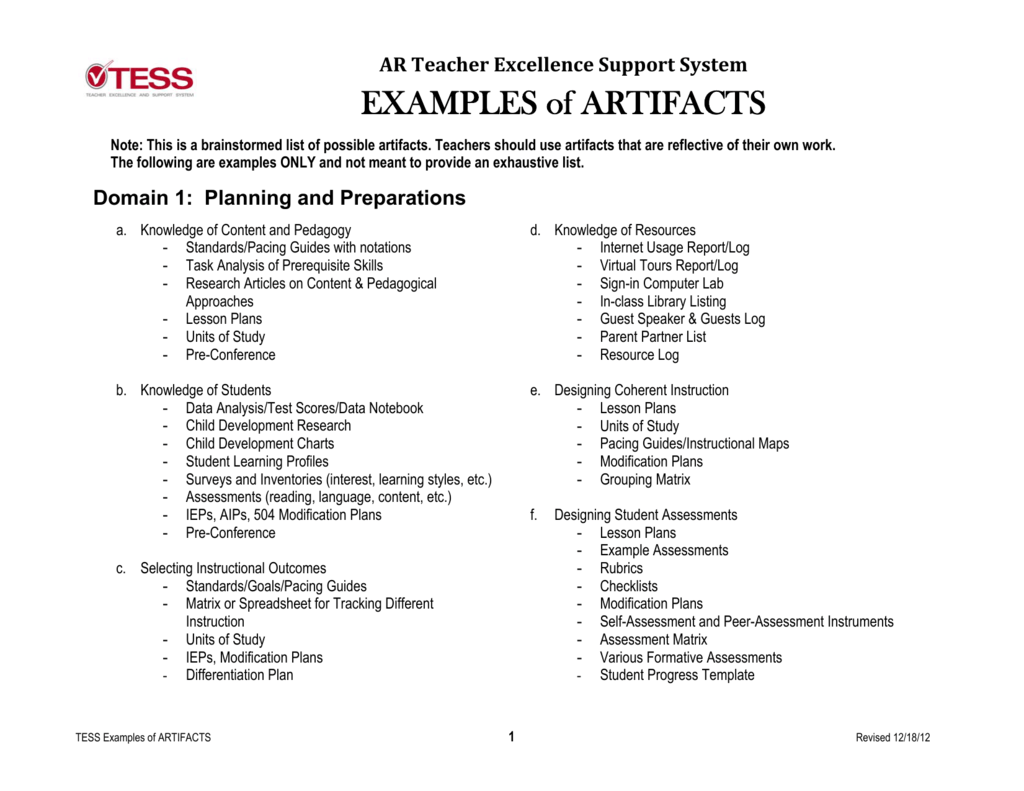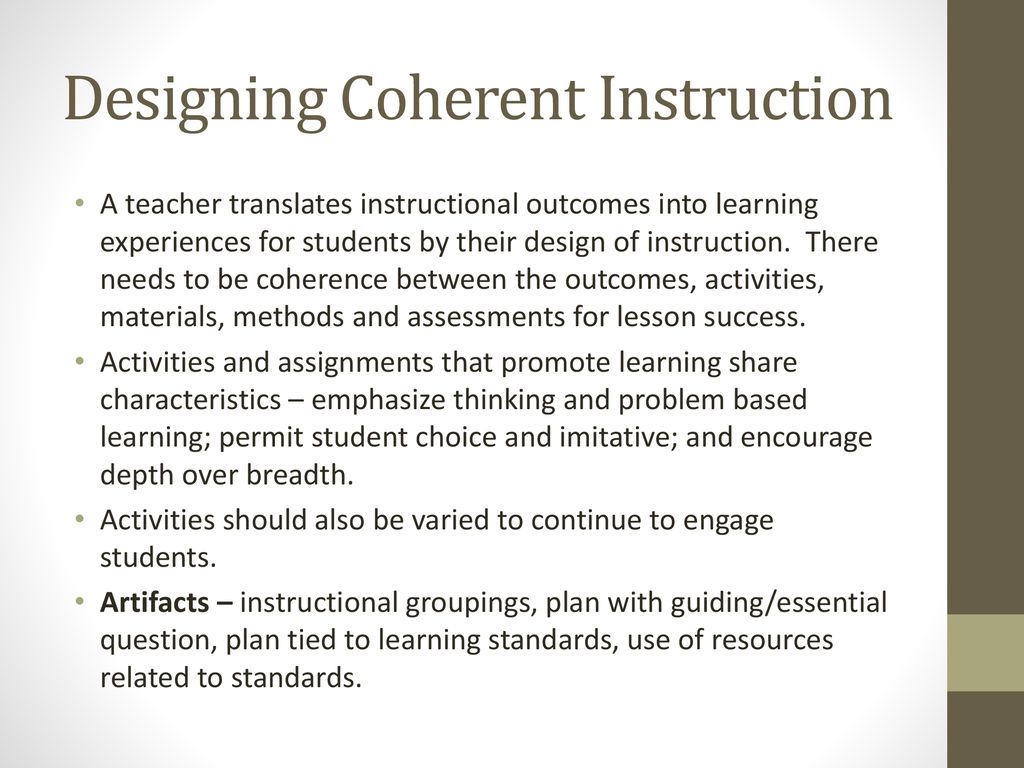Domain 1 Planning and Preparation. Fostering and managing a safe positive learning environment.

Domain 1 Artifacts By Katelyn Hansen
This component requires that our outcomes assessments materials activities teaching methods and standards align.

. Artifacts can provide evidence of. In order to do this we must be knowledgeable of the state standards curricular standards and how they progress and build upon each other. Incorporating word problems into the lesson.
Examples of Possible Artifacts Domain 1. Activities that represent high-level thinking. In order to do this we must be knowledgeable of the state standards curricular standards and how they progress and build upon each other.
Use of varied resources. Lesson plans with different teaching styles. Definition Explanation of ArtifactsMenu.
Why do we Need to Know About Component 1E. Lessons that support instructional outcomes and reflect important concepts. Domain 2 The Classroom.
Designing Coherent Instruction pacing guide building blocksCourse calendars - chunks Unit outlines Lesson plans connected to standards to with byGradual release of responsibility - Assessments Lists of flexible learning groups Differentiated lessons Collaborative learning activities for students. Designing coherent instruction Executing coherent instruction requires that teachers understand what is expected of them from the state school district and school. Students should also be able to choose HOW to show what they know by means of Differentiated Instruction.
Designing coherent instruction -Evaluator teacher. These should challenge students to think deeply and broadly as well as breaking routine thinking. Activities provide opportunity for higher-level thinking.
Demonstrating knowledge of resources guest speakers iPads SMART Boards 1e. Designing Coherent Instruction Unit Plan Activity or assignment 1f. It also requires teachers to design lessons that grow their students and it requires all aspects of component 1 to align with each other.
Designing Student Assessments - Lesson Plans - Example. Knowledge of Content and Pedagogy. Component 1E of the Danielson Framework is Designing Coherent Instruction.
Some artifacts that relate to designing coherent instruction are. - Artifacts that show differentiation - Artifacts of student interests and backgrounds learning style outside of school commitments work family responsibilities etc - Differentiated expectations based on. Opportunities for student choice.
The number of artifacts to collect varies by educator. Designing Student Assessments Unit Plan Activity or assignment. Designing Coherent Instruction Coherent instruction means that the outcomes materials activities teaching methods and standards must be closely related.
In order for this to occur teachers must be informed about state and curricular standards and lessons must challenge students whatever their level. Designing coherent instruction requires that our outcomes assessments materials activities teaching methods and standards align. This is a brainstormed list of possible artifacts.
The teacher provides a variety of appropriately challenging materials and resources. Artifacts should show that the teacher is remaining up-to-date with current pedagogical practice List of content-area courses taken to advance. 1a Demonstrating knowledge of content and pedagogy Content knowledge Prerequisite relationships Content pedagogy.
This planning requires teachers having a clear understanding of the state district and school expectations for student learning. Artifacts of Component 1E Collaborative learning activities for students Present information using. The lesson as a whole should be thoroughly planned and organized to.
State and district rules. Component 1E is when an educator creates lessons that are challenging yet doable for their students. Teachers need the skills to translate these.
A teacher who looks at instruction holistically will increase. Coherent Instruction means that our teaching is holistic. Designing coherent instruction Learning activities Instructional materials and resources Instructional groups.
Framework Guidelines ArtifactsActions to Illustrate Proficiency. The collection and presentation of artifacts can help provide information and evidence related to teaching. Component 1e is designing coherent instruction how important it is planning reflecting teachers knowledge of content and students in the class intended outcomes and available resources.
The plan for the lesson or unit is well structured with reasonable time allocations. We need to make sure that our activities assessments materials and objectives align with our goals for instruction. Designing Coherent Instruction What is Component 1E.
Instructional maps that indicate relationships prior learning. Component 1E is all about instruction the crux of teaching. Planning instruction that increase the students understanding by assessment outcomes knowledge of the students and relating the material to the state standards.
Designing coherent instruction questioning level of questioning based on student need Criterion 5. This component of Danielsons Framework involves reflecting the teachers knowledge of content their students the intended outcomes and the available resources when designing instruction. Learning activities are matched to instructional outcomes.
To test the engagement level of students teachers can look at the quality of the work produced. Artifacts are things that document the work that teachersadministrators do off stage in preparation for and in reflection upon their work with studentseducators. What is Component 1E.
Designing Coherent Instruction - Lesson Plans - Units of Study - Pacing GuidesInstructional Maps - Modification Plans - Grouping Matrix f. Teachers should use artifacts that are reflective of their own work. Artifacts should be a sample that demonstrates educator performance and impact.
Designing Coherent Instruction Lesson Plans show progression of continuity Curriculum Mapping Teacher and student reflection of lessons learning or feedback written or oral Student developed rubric tied to specific goals Concept Maps. Instructional outcomes lesson plan learning targets reflections 1d. Thoughtfully planned learning groups.
EXAMPLES of ARTIFACTS Note. Continuing education in the content area Lesson plans incorporating best practices Sharing new knowledge with peers In-Service TrainingWorkshops in content area Active involvement in Professional Learning Communities logs team agendas Trouble-shooting teacher writes a. 1e Designing Coherent Instruction.
Group projects- systematically developed based on learning styles. Designing Coherent Instruction Instruction is an important part to who we as teachers are and this Danielson domain completely focuses on instruction. Artifacts should show that the teacher is remaining up-to-date with current pedagogical practice List of content-area courses taken to advance.
It is all about designing instruction that enhances our students. Not only on simply instruction but on designing flowing understandable instruction.

Facilitator Notes This Session Is Designed For Approximately 3 5 Hours Each Slide Includes An Approximate Amount Of Time For The Discussion Activity Ppt Download
Domain 1 Planning And Preparation Giancarlo Torres

Possible Artifacts For Danielson Domains One And Four Pdf Free Download

Lisa Nielsen The Innovative Educator Showcasing Artifacts Evidence To Demonstrate Teachereffectiveness With Danielson Domains

Tess Examples Of Artifacts Logo

Planning And Preparation Ppt Download


0 comments
Post a Comment